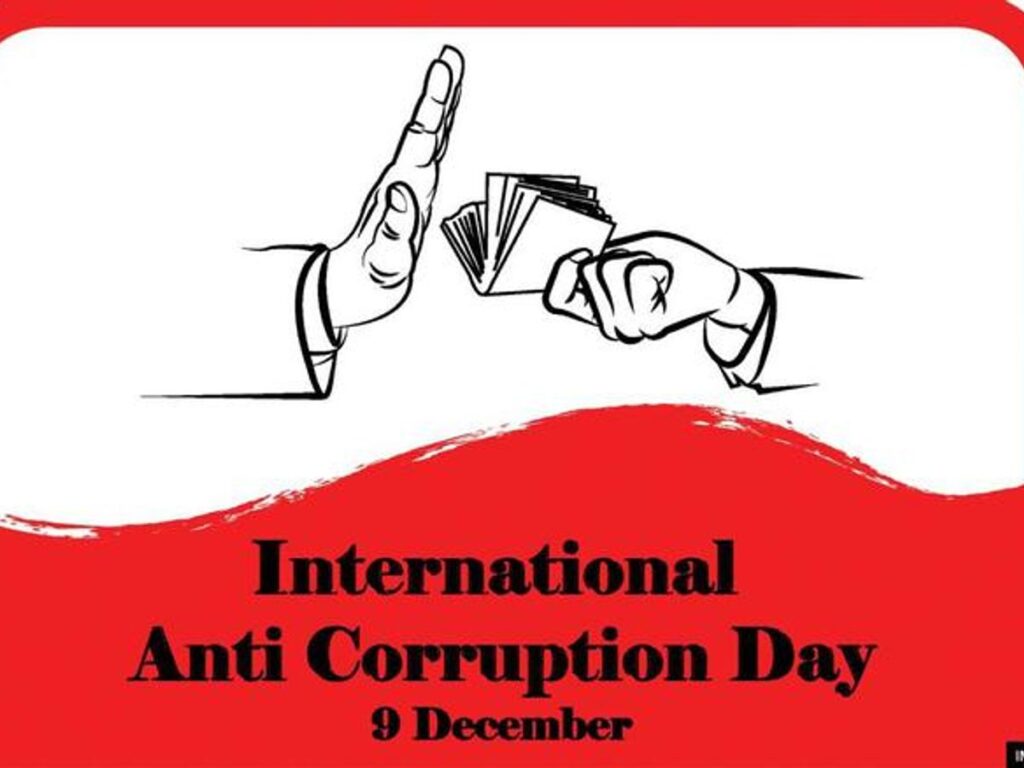International Anti-Corruption Day

International Anti-Corruption Day, observed every December 9th, is a global event aimed at raising awareness about the harmful effects of corruption and encouraging people and governments to take action against it. The day highlights the need for integrity, accountability, and transparency in both public and private sectors, as well as the importance of eradicating corruption to foster sustainable development, social justice, and economic stability.
The Historical Context of International Anti-Corruption Day
International Anti-Corruption Day was established by the United Nations in 2003, following the adoption of the United Nations Convention Against Corruption (UNCAC). This landmark treaty, signed by 140 countries, was created to address the widespread issue of corruption, which undermines governance, impedes development, and fosters inequality across the world.
The day serves as a reminder of the global community’s collective responsibility to combat corruption in all its forms. Corruption, which can involve bribery, embezzlement, money laundering, and other unethical practices, affects millions of people worldwide, hindering progress in areas such as education, healthcare, and human rights. By dedicating a day to this issue, the UN seeks to mobilize support for stronger anti-corruption measures and promote a culture of integrity.
The Importance of International Anti-Corruption Day
International Anti-Corruption Day emphasizes the significant role that corruption plays in hindering development, worsening poverty, and perpetuating inequality. It also highlights how corruption weakens institutions, damages public trust, and impedes the rule of law. This day calls on individuals, organizations, and governments to work together to promote transparency, good governance, and the enforcement of laws that prevent corruption.
The holiday encourages actions aimed at reducing corruption, including:
- Raising Awareness
International Anti-Corruption Day helps inform the public about the negative consequences of corruption and educates people about the importance of integrity and ethical behavior in all aspects of life. - Advocating for Legal and Institutional Reforms
The day calls for reforms in legal frameworks and institutions that will strengthen anti-corruption measures, ensuring that public officials and private individuals are held accountable for their actions. - Promoting Transparency and Accountability
It encourages the establishment of systems that allow for transparency in government and business dealings. By promoting open data, whistleblowing protections, and free media, governments can build public trust and prevent corrupt practices. - Building Public Participation
International Anti-Corruption Day also calls on individuals to get involved in anti-corruption efforts, whether through participating in advocacy campaigns, supporting anti-corruption organizations, or standing up against corruption in their communities.
Celebrating International Anti-Corruption Day
International Anti-Corruption Day is marked by a variety of events and activities around the world, which include:
- Public Campaigns and Protests
Activists, organizations, and governments often organize public campaigns, protests, and rallies to raise awareness about the fight against corruption. These events may include speeches, discussions, and media outreach efforts aimed at inspiring action. - Educational Programs and Workshops
Many schools, universities, and organizations hold workshops, seminars, and discussions on corruption prevention and good governance. These programs aim to engage young people and civil society in the fight against corruption and inspire them to contribute to creating transparent systems. - Media and Social Media Campaigns
A strong emphasis is placed on the role of media in reporting corruption and raising awareness. International Anti-Corruption Day sees a flurry of social media campaigns, articles, and broadcasts that share stories of corruption’s impact and promote calls to action. - International Collaboration and Partnerships
Governments, businesses, and civil society organizations collaborate on initiatives to address corruption and promote ethical practices. The day often sees the launch of new partnerships aimed at strengthening anti-corruption efforts.
The Significance of International Anti-Corruption Day
International Anti-Corruption Day is vital for fostering a collective global effort to eradicate corruption and promote good governance. It serves as a day of reflection on the progress made in tackling corruption and a reminder of the long road ahead. The day’s significance lies not only in raising awareness about corruption but also in inspiring tangible actions that lead to the creation of more transparent, fair, and just societies.
As corruption continues to be a major challenge in many parts of the world, International Anti-Corruption Day serves as a platform to unite efforts to address this issue. It encourages individuals, businesses, and governments to uphold the values of honesty, integrity, and accountability, ensuring a brighter and more equitable future for all.
International Anti-Corruption Day is a crucial observance in the global fight against corruption, bringing attention to its detrimental effects and highlighting the need for reforms that promote transparency and justice. As the world continues to address corruption’s far-reaching consequences, this day serves as a reminder that combating corruption requires collective efforts at every level of society. By educating, advocating, and acting together, we can build a world where corruption is minimized and integrity is valued.
